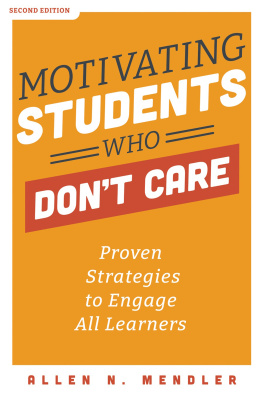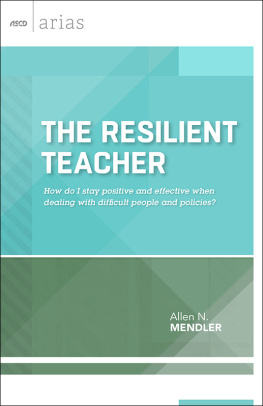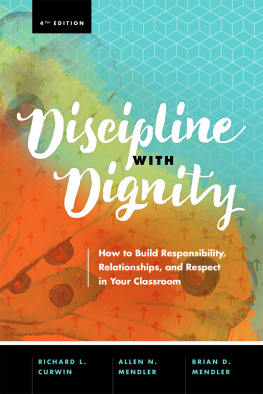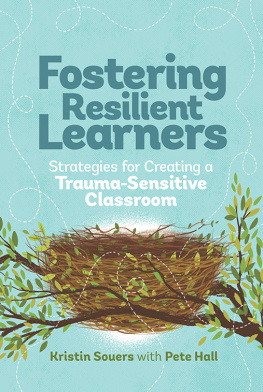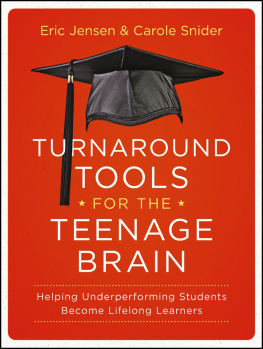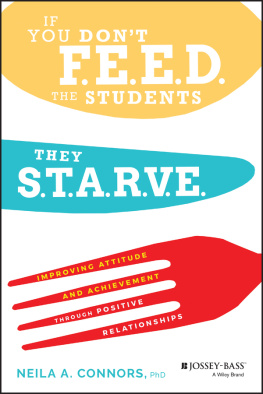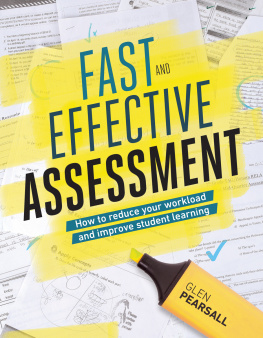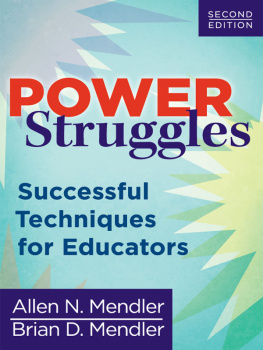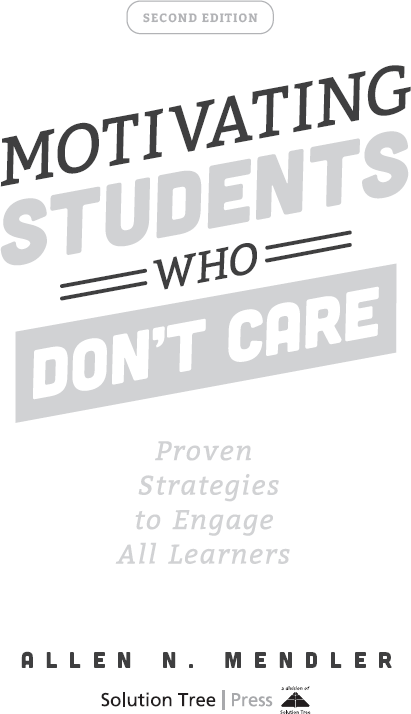Table of Contents
Page List
Guide
Copyright 2021 by Solution Tree Press
Materials appearing here are copyrighted. With one exception, all rights are reserved. Readers may reproduce only those pages marked Reproducible. Otherwise, no part of this book may be reproduced or transmitted in any form or by any means (electronic, photocopying, recording, or otherwise) without prior written permission of the publisher.
555 North Morton Street
Bloomington, IN 47404
800.733.6786 (toll free) / 812.336.7700
FAX: 812.336.7790
email:
SolutionTree.com
Visit go.SolutionTree.com/studentengagement to download the free reproducibles in this book.
Printed in the United States of America
Library of Congress Cataloging-in-Publication Data
Names: Mendler, Allen N., author.
Title: Motivating students who dont care : proven strategies to engage all learners / Allen N. Mendler.
Description: Second edition. | Bloomington, IN : Solution Tree Press, 2021. | Includes bibliographical references and index.
Identifiers: LCCN 2020052607 (print) | LCCN 2020052608 (ebook) | ISBN 9781951075439 (paperback) | ISBN 9781951075446 (ebook)
Subjects: LCSH: Motivation in education. | Students--Attitudes.
Classification: LCC LB1065 .M377 2021 (print) | LCC LB1065 (ebook) | DDC 370.15/4--dc23
LC record available at https://lccn.loc.gov/2020052607
LC ebook record available at https://lccn.loc.gov/2020052608
Solution Tree
Jeffrey C. Jones, CEO
Edmund M. Ackerman, President
Solution Tree Press
President and Publisher: Douglas M. Rife
Associate Publisher: Sarah Payne-Mills
Art Director: Rian Anderson
Managing Production Editor: Kendra Slayton
Copy Chief: Jessi Finn
Senior Production Editor: Christine Hood
Content Development Specialist: Amy Rubenstein
Proofreader: Kate St. Ives
Text and Cover Designer: Kelsey Hergl
Editorial Assistants: Sarah Ludwig and Elijah Oates
This book is dedicated to the memory of Dr. Rick Curwin, my best friend, colleague, frequent coauthor, mentor, and a great educator. He was a fierce advocate of the idea that school must be for the benefit of every student, and he leaves a legacy of having passionately conveyed that in his teachings and writings to the thousands of educators throughout the world. Our journey continues.
ACKNOWLEDGMENTS
I would like to thank the many dedicated educators who have contributed to this book. It is the struggles we often share together that helped shape and refine many of the strategies presented. To the numerous educators who shared how helpful they found the first edition, I thank you for providing the impetus to update it. My wife Barbara, who is one of the best teachers I have ever seen, offered ideas and support along the way. Your love, and that of our children and grandchildren, is the most important fulfillment in my life. Thanks to Christine Hood, my editor at Solution Tree, for her excellent, detailed feedback. To Shik Love and Kelly Rockhill, thanks for your commitment to making this content as widely available to educators as possible. Finally, a loud shout-out to Douglas Rife, president and publisher of Solution Tree Press, for his enthusiasm and support for this project.
Solution Tree Press would like to thank the following reviewers:
Hallie Edgerly
Science Teacher
Adel DeSoto Minburn Middle School
Adel, IA
Alexander Fangman
Principal
Grants Lick Elementary School
Alexandria, KY
Kimberly Freiley
English Language Arts Teacher
Ingersoll Middle School
Canton, IL
Amy Kochensparger
Science Teacher
Eaton High School
Eaton, OH
TABLE OF CONTENTS
ABOUT THE AUTHOR
Allen N. Mendler, PhD, is an educator and school psychologist who lives in Rochester, New York. He has extensive experience working with students of all ages in regular and special education settings. Allens emphasis is on developing effective frameworks and strategies for educators, youth professionals, and parents to help students with learning and behavior problems succeed.
Allen has given many workshops and seminars to professionals and parents and is highly acclaimed as a motivational speaker and trainer for numerous educational organizations on topics pertaining to challenging students. He is the author or coauthor of many publications, including the fourth edition of Association of Supervision and Curriculum Developments iconic Discipline With Dignity. Other publications include best-sellers Connecting With Students, Power Struggles, When Teaching Gets Tough, and the first edition of Motivating Students Who Dont Care. Allens books and articles have been translated into several languages, including Arabic, Chinese, Dutch, Korean, Spanish, Slovene, and Polish. He has blogged frequently for Edutopia and other online organizations. Allen received his bachelors degree in psychology at Queens College (CUNY), his masters degree in school psychology at Alfred University, and his doctoral degree at Union Institute and University.
To learn more about Allens work, follow him @allenmendler on Twitter.
To book Allen Mendler for professional development, contact .
INTRODUCTION
Motivation is the art of getting people to do what you want them to do because they want to do it.
DWIGHT D. EISENHOWER
Do any of these comments sound familiar?
This class is boring.
When am I ever going to use this?
Its not fair.
Whyre you always picking on me?
You cant make me do this!
More than half of all students in grades 512 surveyed in a 2016 Gallup poll reported being either not engaged or actively disengaged in school. A survey by Education Week found that only 40 percent of participating teachers and administrators thought that most of their students were highly motivated. The percentage was far less among educators in high poverty schools (Collier, 2015). It doesnt take a study to know that just a few years earlier, most of these students were filled with enthusiasm as they began their academic journeys. With rare exception, the students who show little interest in learning were once bright-eyed, eager learners. Most parents of toddlers will find them defiant at times, but never unmotivated. In fact, they are so eager to learn that their parents often need to put up gates, move furniture, and block electrical outlets to contain their childs curiosity. And usually, most young children cant wait for their first day of school to arrive.
Why Some Students Are Unmotivated
Increasing motivation and minimizing behavior problems remain at or near the top concerns expressed by educators. Virtually every classroom has students who expect success but are unwilling to work for it. During this age of abundance and entitlement, guilt can lead parents to give materially to their children without attaching expectations. Expectations of entitlement are easy to acquire in a culture that too often values what we have rather than who we are.

